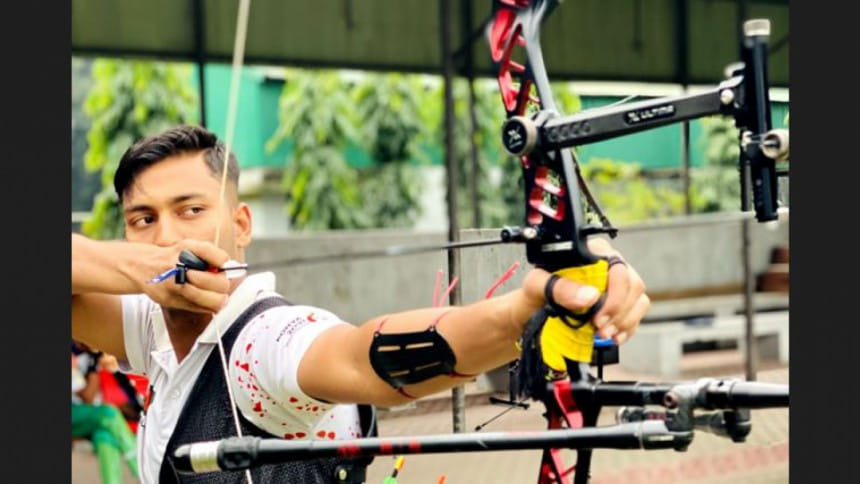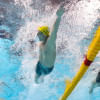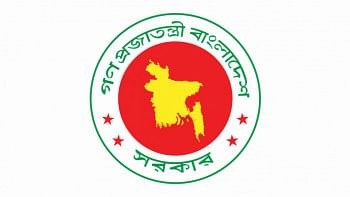'Archery is as much a mental game as it is physical'

Archer Sagor Islam, at just 18 years old, has made history as the youngest athlete from his country to earn a direct spot in the Olympic Games, following in the footsteps of golfer Siddiqur Rahman and archer Ruman Sana who achieved the same in previous editions. Overcoming poverty with unwavering support from his widowed mother, BKSP, and the Bangladesh Archery Federation, Sagor, a high school student in the 11th grade, has reached this milestone. While he has not yet won an individual event medal in either domestic or international competitions, Sagor surprised many by securing a direct Olympic entry and even clinching a silver medal in last month's Final Olympic Quota tournament. The lad from Rajshahi discussed his career, passion for archery, and future aspirations with The Daily Star's Anisur Rahman in an exclusive interview, the excerpts of which are as follows:
The Daily Star (DS): How did you feel talking to your mother from Turkey after securing a direct entry to the Paris Olympic Games?
Sagor Islam (SI): It took me nearly four hours to reach my mother by phone from the hotel in Turkey because I had no network during the competition. When I asked her if she knew about my achievement, she replied positively and blessed me, hoping for even better results in the Olympics. At that moment, I felt like the most successful son in the world; I felt like I was number one. My mother's happiness is my happiness because she raised me without my father, fulfilling as many of my demands as she could. I have come this far because of her.
DS: What were your expectations going into the Final Olympic Quota tournament in Turkey?
SI: We started to believe that our hard work and continuous practice could lead to something significant. Others also supported us in achieving our goals. I personally believed that this year, with seven months of relentless training, we had become really strong.
DS: There were high expectations for the men's recurve team to secure a quota place, but they were eliminated in the quarterfinals, and you outshone them in the individual events as the youngest team member.
SI: Yes, we had hoped for a lot from the team event, but things didn't go as planned. Sometimes, despite our best efforts, we cannot control the outcome. We approached the competition in our own way, but unfortunately, we didn't succeed.
DS: What was going through your mind when you entered the quarterfinals following the elimination of two teammates in previous rounds?
SI: I started with a positive mindset. I focused solely on my performance without worrying about others because I had nothing to lose. I was confident that if I performed to the best of my ability, I could secure a direct quota place for the Paris Olympics.
DS: You will be competing against the world's top archers in the upcoming Paris Olympics, although they were absent from the Final Olympic Quota tournament in Turkey. How confident are you in your ability to compete with them?
SI: Korean archers and other top archers qualified directly. I achieved the same qualification as they did, so I never considered myself inferior to them. I believed I am on their level because I competed against archers from all over the world, not just Asia.
DS: What kind of training are you undergoing now under German coach Martin Fredrick in Tongi, following your qualification for the Paris Olympics?
SI: Previously, the coach focused on all members of the national team, but now he is solely guiding me for the Olympics. I continue to train by shooting over 320 arrows every day, similar to what I did during national camp. Fredrick and others are inspiring me greatly to boost my confidence and provide mental motivation so that I can perform well in the Olympics.
DS: What are your thoughts on the Paris Olympics?
SI: It's hard to predict my own performance at the Paris Olympics, but I am confident that if I perform naturally, I can compete with anyone and bring a medal home for the nation. The biggest challenge for me is to stay composed during critical moments and maintain my focus, as archery is as much a mental game as it is physical.
DS: How do you feel about the discussion to potentially send Hakim Ahmed Rubel instead of you to the Paris Olympics?
SI: I think it's normal because I earned the quota for the nation, and the coach and federation have the right to decide what's best for the country. I didn't feel upset about it because I would have accepted whatever decision the coach and federation made. Nevertheless, I am grateful to finally represent the nation at the Paris Olympics.
DS: What are your expectations from the other athletes – Imranur Rahman, Robiul Islam, Samiul Islam, and Sonia Akter – participating in the Paris Olympics?
SI: It's a rare opportunity to compete in the Olympics, so I hope they will give their best efforts to achieve something for the nation. In sports, there are no guarantees that even a talented athlete will succeed. As for archery, anything can happen.

 For all latest news, follow The Daily Star's Google News channel.
For all latest news, follow The Daily Star's Google News channel. 







Comments